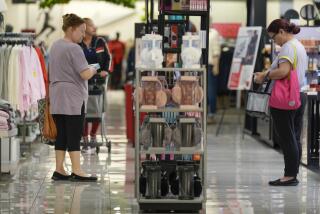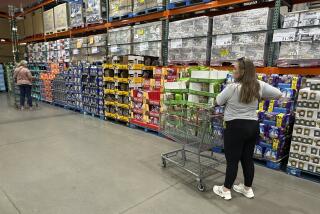Spending Down; New-Home Sales Up
- Share via
WASHINGTON — Consumers, lacking any appreciable increase in incomes, cut back their spending 0.1% in April, the government said Thursday in a report that cast further doubt on anything better than a sluggish recovery from the recession.
Analysts said two other reports--a slight increase in new-home sales in April for the third month in a row and a slim decline in new claims for unemployment benefits for the second straight week in mid-May--also suggested a slow turnaround in the economy this summer.
“There’s a strong indication in the latest numbers that the recovery is going to be quite weaker than normal,” said economist David Jones of Aubrey G. Lanston & Co., a New York securities firm.
The Commerce Department said consumer spending, expected to be the engine driving the economy out of the recession, totaled a seasonally adjusted annual rate of $3.78 trillion in April.
That was down from $3.782 trillion in March and ended a two-month string of advances. Still, the revised 1.1% gain in March was stronger than the 0.6% advance first reported.
The department also said personal incomes, another key to recovery, rose just 0.1% to $4.76 trillion at an annual rate, up from $4.75 trillion a month earlier.
Despite the diminutive gain, it was the third consecutive advance in incomes. The department also revised the March increase to 0.4%, rather than the 0.2% in its original report.
Consumers are expected to lead the economy out of recession since their spending represents two-thirds of the nation’s economic activity. But analysts said consumers are being restrained by high unemployment and interest rates and weak income growth and tight credit.
Still, the Commerce Department said in another report that sales of new homes rose 1.2% in April to a seasonally adjusted annual rate of 500,000 units. It was the third monthly advance since sales plunged 10.8% to a 414,000 rate in January, the lowest level since the 1981-82 recession.
Most other housing indicators have also improved since their January lows, leading analysts to suggest that the housing recession hit bottom that month. But they are forecasting the recovery to be subdued.
However, the number of Americans behind on mortgage payments rose by 341,000 in the first three months of this year, with states in the Northeast and the South suffering the most, according to a national survey by the Mortgage Bankers Assn.
The trade group said the percentage of homeowners behind 30 days or more on their payments climbed in the first quarter to 4.95% of the 45.6 million mortgage holders.
That was up more than one-half percentage point from the 4.41% national delinquency rate in the first three months of 1990. It compared to a rate of 4.71% in the October-December quarter.
In its report, the Labor Department said the number of Americans filing first-time unemployment claims fell by 9,000 during the week ended May 18 to 445,000, after a drop of 5,000 the previous week.
In another report, the Commerce Department reported that after-tax profits of U.S. corporations plummeted 5.6% in the first three months of this year, the worst showing since late 1989.
The first-quarter decline followed a 1% drop in the fourth quarter of last year, the department said.
More to Read
Inside the business of entertainment
The Wide Shot brings you news, analysis and insights on everything from streaming wars to production — and what it all means for the future.
You may occasionally receive promotional content from the Los Angeles Times.










